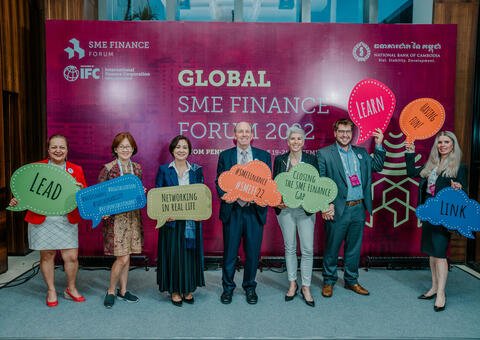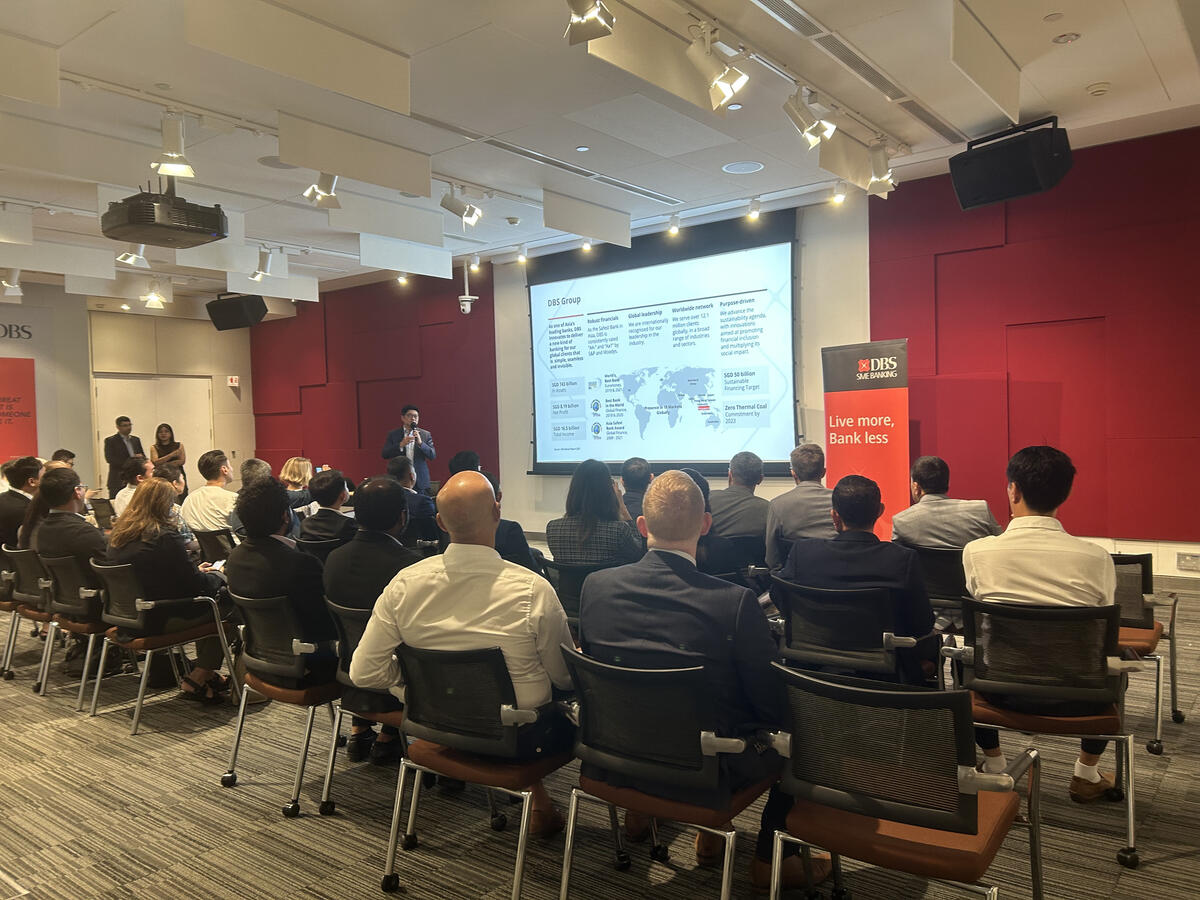Blog
Digitalization is vital to helping the world’s small and medium sized enterprises

At the Global SME Finance Forum 2022 Harnessing Digitalization for Sustainable and Inclusive SME Finance, more than 350 leaders and senior executives from 60 countries and over 180 banks, Fintechs and regulatory agencies gathered in Phnom Penh, Cambodia. Co-hosted by the National Bank of Cambodia and the SME Finance Forum, top-tier experts explored the opportunities and challenges of digitalization as a powerful tool to create and improve conditions for SMEs.
Big data, AI, machine learning, and other evolving and emerging digital technologies can enable financiers to serve more SMEs faster, more efficiently and with increased innovation. However, digitalization is not a panacea and there are challenges in the process of adoption such as inclusivity, data protection and access to basic infrastructure.
Delivering inclusive and effective SME banking
SMEs face significantly more constraints than larger firms in accessing finance, particularly in emerging markets. IFC estimates that about 43 percent of formal SMEs in developing countries have an unmet financing need of nearly US$4.1 trillion. Without access to finance, SMEs cannot grow and create jobs, and harnessing digitalization can be a vital tool into supporting these businesses:
- It can enable inclusion of women-owned SMEs, very small enterprises, climate-smart SMEs and other marginalized and unbanked populations and sectors;
- It can reduce global carbon emissions when decarbonization is embedded in financial products and green sustainability is tracked;
- It can increase data availability and analysis, allowing credit bureaus for instance to use new sources of data to create more comprehensive lender profiles; and
- It can empower businesses by offering them more flexibility and inclusivity as well as quicker access to funding.
In her closing speech at the Global SME Finance Forum 2022, Her Excellency Dr. Chea Serey, Assistant Governor of the National Bank of Cambodia, stated: “In Cambodia, we promote electronic payment because we want to create some digital footprints for SMEs to help financial institutions better serve them.”
In further support of the benefits of digitalization, Tomasz Telma, Director of the Financial Institutions Group at IFC shared that “digitalisation and automation make it possible to customize products to the needs of various customer segments and makes serving high volume low value segments, like SMEs, both less risky and more profitable for financial institutions.”
Hanh Nam Nguyen, GSMEF Program Manager at IFC shared an example of where digitalization is supporting more inclusive and effective SME banking through the Global SME Finance Facility (GSMEF), where the Facility focuses on the most underserved SME segments that are not normally reached by financial institutions thanks to the use of Blended Finance financial instruments and targeted Advisory Services.
Challenges adopting emerging technologies
While technology and digitalization can be effective tools to achieve greater inclusion and efficiency, they can also exacerbate the very problems they seek to address, so anticipation and assessment of unintended consequences are important in making sure that digitalization is equitable and that mitigating actions can be taken to minimise the potential harm.
Michael Schlein, President and CEO of Accion reminded us of the importance to build an inclusive and resilient digital revolution. For example, mobile money accounts are having a big impact, but billions of people are still invisible to the global financial system. Accion is offering consumer education and financial literacy products that will help people join the digital economy, and maximize the impact of new tools whilst minimising harm.
In line with the need for financial literacy, Ravi Valecha, CEO of India Factoring spoke about the importance of boosting awareness amongst SMEs of new means of finance and the need for a real cultural change to financing supply chains in order to keep social impact in mind.
Data protection is also a real challenge when it comes to digitalization and there is an urgency for the proper stewardship and ownership of data. Regulators need to address the issue in collaboration with financial institutions and SMEs to reduce the barriers to entry.
Another constraint to equitable digitalization is the need for basic infrastructure development, and this last mile problem is particularly acute in the poorest countries where the majority of people live in rural areas. The availability of mobile and internet infrastructure and tools may not be uniformly available, nor might the costs associated with these services be easily borne by SMEs.
An efficient and easy to use digital infrastructure will lead to higher adoption rates among SMEs, and as Edoardo Borsari, Managing Director at Strands said, “an infrastructure that collects and stores data effectively is the key foundation to be able to enable digitalization at a later stage.”
Trends and lessons
During the Global SME Finance Forum 2022, speakers shared their experiences and good practices and approaches in supporting the SME sector’s finance and growth across myriad countries and regional markets. A few repeated themes emerged.
The power of partnerships
We heard calls for banks to change their organizational mindsets when it comes to investing in SMEs. This necessitates new ways of thinking and also exploration of partnerships with the growing number of Fintech companies in order to look at alternative or non-traditional data to gain up to the minute and current information and insights about SMEs and their businesses and creditworthiness at any point in time.
“Fintechs can have a big impact and there is a need for collaboration to achieve inclusive socioeconomic development,” said his Excellency Phan Phalla, Secretary of State for the Ministry of Economy and Finance of Cambodia.
“Small businesses are doing their best to deliver value to their customers, and the role of the banks is to come in and facilitate that process,” said Ivana Tranchini, Country Manager of Cambodia for Visa. “One way is to partner with Fintechs so that data can be shared, and businesses can get a more integrated experience of financial services as a whole.”
And based on a lively debate during the Forum Will machines replace SME bankers? partnership also applies to humans and robots with the judicious and appropriate utilization of technology such as AI, in service to and support of human bankers. As argued by Joyce Tee, Managing Director and Group Head of SME Banking for DBS, “despite how advanced technology can be, humans and robots should be working hand in hand. Bankers are using robots to enable their business and get more efficient, not to replace them.”
Put yourself in your client’s shoes
We (bankers) like to think that the clients need us, but they don’t. They need banking. In fact, they don’t even indeed do banking. What they need is the time to run their businesses” said Rajeev Chalisgaonkar, Head of Business Banking, Mashreq Bank.
In the session Payment Innovations and the Future of SME Finance, Jay Singer, SVP for Global SME Product Development of Mastercard made the point, “I have talked to many small businesses, they don’t care how banking and payments operate, or more importantly, they don’t understand all these challenges. Therefore, anything we do has to be simple, it has to solve issues so clients can transact and manage their data safely, helping them grow their businesses. Simplicity is the key, education is critical.”
This focus on the customer experience and the notion of ease and simplicity was echoed by H.E. Dr. Chea Serey, Assistant Governor of the National Bank of Cambodia, “to encourage people to go into the digital payment space, you must make the digital payment easy. And to make it easy, it has to be cheap, fast and convenient.” In fact, the National Bank of Cambodia developed Bakong Cambodia’s only all-in-one mobile payment and banking app by combining e-wallets, mobile payments, online banking and financial applications within one easy-to-use interface for any preferred bank account.
Regulation has a role to play
Regulatory frameworks are important to establish trust in any burgeoning consumer centric models and can facilitate and ensure the quality and validity of data. But obviously the type and the timing are consequential when implementing regulations to balance innovation and data protection.
H.E. Chea Ratha, Under Secretary of State of the Cambodian Ministry of Industry, Science, Technology & Innovation (MISTI), laid out the Cambodian government’s interest in leveling the digital playing field through policy and action. She said” as we know, a supportive and intelligent regulatory ecosystem is important for digitalization to occur at a pace and reach that lifts all boats and not just some.”
But as Naveen Subramaniam, Managing Director, Head of Structured & Trade Export Finance APAC with Intesa Sanpaolo shared, “you don’t always have to wait for the regulatory framework to match available tech. Regulations are an enabler, but the market can wait for them to catch up and in the meantime, still have legitimate ways to operate.”
Looking Forward
There is exciting growth in the use of digital tools and there is almost boundless potential to leverage technology to support SMEs.
This sense of hope and optimism was relayed during both the opening and closing remarks, confirming that the future of delivering inclusive and effective banking support for the world’s SMEs will be driven by digital transformation.
Tomasz Telma, Director of the Financial Institutions Group at IFC highlighted that data driven solutions are replacing traditional credit histories and collateral, and that SME-focused Fintech lenders have a big role to play in closing the SME finance gap.
In his videotaped closing remarks, Piyush Gupta, CEO of DBS, inspired the audience with his remarks, providing the audience with four game-changing trends he sees going forward:
- Digitalization of access: The cost of access to serve SMEs has decreased dramatically, enabling faster decisioning. For example, DBS Quick Finance states “1 minute to apply, 1 second for approval, and 0 seconds to disburse” and this faster decisioning is available from other financiers as well.
- The power of ecosystems: Using Application Programming Interfaces (APIs), banks are able to join ecosystems and platforms where SMEs are conducting their day-to-day business to be able to make a difference in real time.
- Growing data: Access to wider and more diverse data sets, behavioral data in particular, allows bankers and others to underwrite loans almost instantaneously, even to SMEs without collateral.
- Using artificial intelligence: With AI, we can make sense of the data and scale new use cases.
As Her Excellency Dr. Chea Serey, Assistant Governor of the National Bank of Cambodia, so ably stated in her closing to the event, “the future is digital” and “any financial services provider today must have a strategy for going digital.”



























